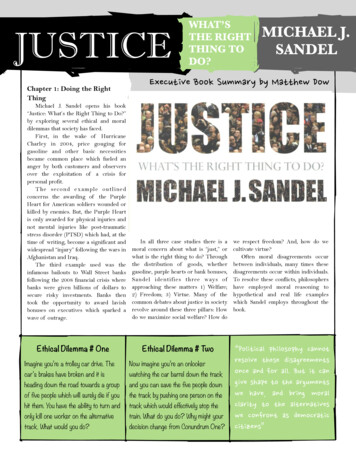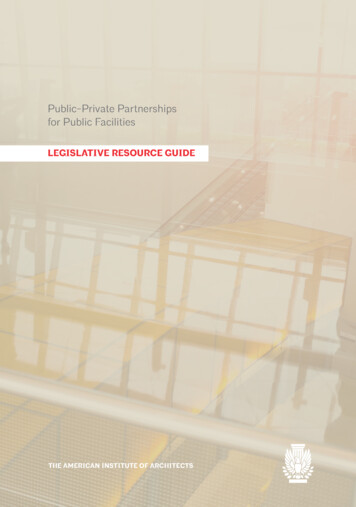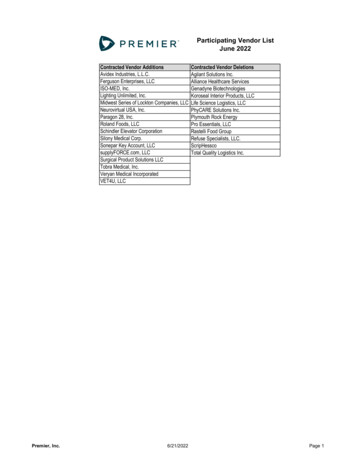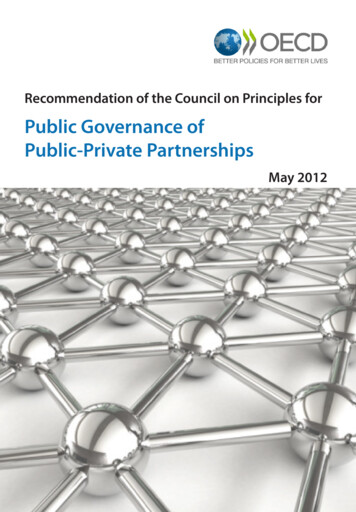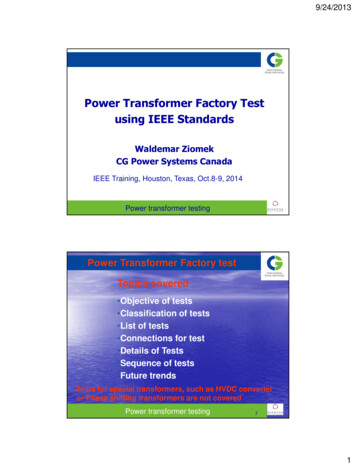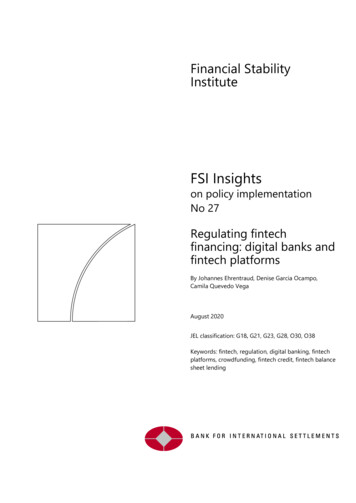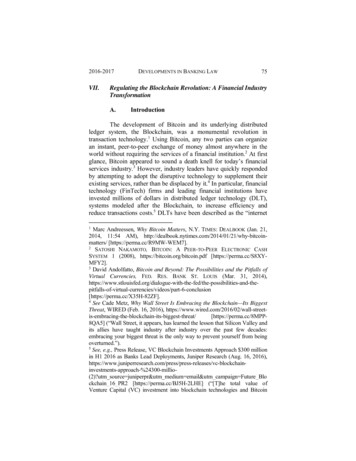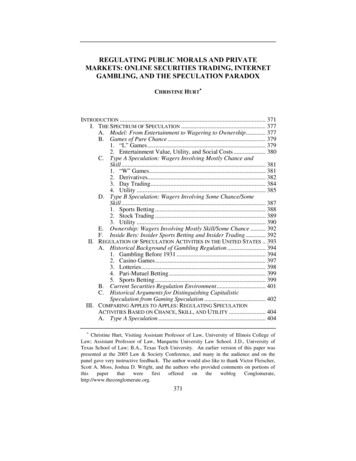
Transcription
REGULATING PUBLIC MORALS AND PRIVATEMARKETS: ONLINE SECURITIES TRADING, INTERNETGAMBLING, AND THE SPECULATION PARADOXCHRISTINE HURT INTRODUCTION . 371I. THE SPECTRUM OF SPECULATION . 377A. Model: From Entertainment to Wagering to Ownership. 377B. Games of Pure Chance. 3791. “L” Games. 3792. Entertainment Value, Utility, and Social Costs . 380C. Type A Speculation: Wagers Involving Mostly Chance andSkill. 3811. “W” Games. 3812. Derivatives. 3823. Day Trading. 3844. Utility . 385D. Type B Speculation: Wagers Involving Some Chance/SomeSkill. 3871. Sports Betting . 3882. Stock Trading . 3893. Utility . 390E. Ownership: Wagers Involving Mostly Skill/Some Chance . 392F. Inside Bets: Insider Sports Betting and Insider Trading . 392II. REGULATION OF SPECULATION ACTIVITIES IN THE UNITED STATES . 393A. Historical Background of Gambling Regulation . 3941. Gambling Before 1931 . 3942. Casino Games. 3973. Lotteries. 3984. Pari-Mutuel Betting . 3995. Sports Betting . 399B. Current Securities Regulation Environment. 401C. Historical Arguments for Distinguishing CapitalisticSpeculation from Gaming Speculation . 402III. COMPARING APPLES TO APPLES: REGULATING SPECULATIONACTIVITIES BASED ON CHANCE, SKILL, AND UTILITY . 404A. Type A Speculation . 404 Christine Hurt, Visiting Assistant Professor of Law, University of Illinois College ofLaw; Assistant Professor of Law, Marquette University Law School. J.D., University ofTexas School of Law; B.A., Texas Tech University. An earlier version of this paper waspresented at the 2005 Law & Society Conference, and many in the audience and on thepanel gave very instructive feedback. The author would also like to thank Victor Fleischer,Scott A. Moss, Joshua D. Wright, and the authors who provided comments on portions rate,http://www.theconglomerate.org.371
372BOSTON UNIVERSITY LAW REVIEW[Vol. 86:371B. Type B Speculation . 405C. Insider Speculation: Sure Bets . 406IV. REGULATING FOR THE OUTLIER: THE RECKLESS GAMBLER ANDTHE RECKLESS INVESTOR . 406A. Caveat Speculator . 406B. The Sympathetic Speculator: Profiling the Herd. 4071. Prospect Theory. 4082. House Money . 4093. Speculator Overconfidence . 4094. Illusion of Control . 4105. Representation . 410V. REGULATING INTERNET SPECULATION . 411A. Embracing Online Trading. 411B. Exiling Online Gambling. 4141. Public Policy Relating to Prohibiting Internet Gambling. 416a. Increases in Problem Gambling. 4171.Twenty-Four Hour Access . 4172.Gambling at Home . 4183.Identification Tracking and Manipulation. 4204.Losing Intangible Assets Quickly . 4215.Underage Gambling . 423b. Increased Problem Gambling Increases Social Costs. 425c. Money Laundering . 426d. Fraud. 428VI. GOVERNMENTAL RESPONSE TO INTERNET GAMBLING . 431A. U.S. Enforcement of Anti-Gambling Laws Against InternetGambling Sites. 431B. Recent Legislative Attempts to Prohibit Internet Gambling. 432C. Leveraging Financial Institutions and the Media to ProhibitInternet Gambling . 434D. International Response to U.S. Efforts to Prohibit InternetGambling . 437VII. HARMONIZING THE REGULATION OF INTERNET SPECULATION . 439CONCLUSION. 440INTRODUCTIONRisk-taking is a distinctively American value.1 From the frontier spirit ofthe settler to the entrepreneurial sense of the founder of a start-up company,Americans have been taught to realize “nothing ventured, nothing gained.”2This embracing of risk prompts individuals in the United States to participatein two closely intertwined activities: gambling and investing.1 RICHARD O. DAVIES & RICHARD G. ABRAM, BETTING THE LINE 146 (2001) (quotingsociologist James Frey as saying, “Risk is a very significant part of our lives. . . . Peopledon’t want to admit it, but a great part of gambling is consistent with the American way.”).2 See id. (quoting psychologist Robert Custer as saying, “The Americans came in as thepioneers, the risk takers. They don’t mind taking the risk, and they will take theconsequences.”).
2006] REGULATING PUBLIC MORALS AND PRIVATE MARKETS373To characterize investing as gambling has become a trite and toothlessanalogy. However, most worn-out proverbs remain in the conventionalwisdom because a kernel of truth continues to resonate with those who heedthem. In fact, the stereotype of an investor as a gambler seems particularlywell deserved. To gamble is to put something of value at risk on an uncertainoutcome; in other words, “Wagers are economic choices under uncertainty.”3Under this broad definition, investors gamble with every purchase of afinancial instrument.4 In making a securities purchase, some investors buycommon stock of a corporation because they have studied that company’sbusiness plan, find that model to be superior to the company’s competitors, andbelieve that the company’s managers will continue to increase profits, thusraising an undervalued stock price.5 Conversely, some investors buy stock notbecause they assess positive public information but because they have a goodfeeling.6 Others may buy stock merely because they know that others havebought the same or similar stock with some measure of success.7 Still otherschoose to buy or sell stocks based solely on a prediction of whether others willbuy or sell.8 In other words, many investors buy stock for some of the samereasons that gamblers may choose certain slot machines, lottery numbers, orsquares on a roulette table, or choose to bet or fold a certain poker hand.Although many investors act as gamblers, both law and society viewinvesting and gambling quite differently. Regulators characterize investing asan enterprise of skill in which the assiduous and diligent may earn deservedrewards.9 Conversely, gambling is viewed as an enterprise of chance that3Antonio M.R. Vernón, Market Efficiency and March Madness: Empirical Tests ofPoint Spread Betting 1 (Dec. 23, 2003) (unpublished manuscript, on file with the SocialScience Research Network), available at http://ssrn.com/abstract 340820.4 See Thomas Lee Hazen, Disparate Regulatory Schemes for Parallel Activities:Securities Regulation, Derivatives Regulation, Gambling, and Insurance, 24 ANN. REV.BANKING & FIN. L. 375, 401-12, 416-18 (2005) (comparing investing, hedging, insurance,and gambling as risk-taking activities).5 See Lynn A. Stout, Technology, Transactions Costs, and Investor Welfare: Is a MotleyFool Born Every Minute?, 75 WASH. U. L.Q. 791, 803-05 (1997) (commenting that these“information arbitrageurs” may be outnumbered by speculators).6 See Andrei Shleifer & Lawrence H. Summers, The Noise Trader Approach to Finance,J. ECON. PERSP., Spring 1990, at 19, 23 (describing uninformed traders who respond to“pseudo-signals,” such as the advice of “financial gurus”).7 This type of “noise trading” can be described as “trend chasing” or “positive feedbacktrading.” Id. at 23, 29.8 Id. at 29-30 (describing the tendency of arbitrageurs to “jump[] on the bandwagon” bypredicting where investor sentiment is going and when it will stop).9 See U.S. Securities and Exchange Commission, The Investor’s Advocate: How the SECProtects Investors, Maintains Market Integrity, and Facilitates Capital Formation,available at http://www.sec.gov/about/whatwedo.shtml (last visited Mar. 20, 2006) (“Theworld of investing is fascinating and complex, and it can be very fruitful. . . . [I]nvesting isnot a spectator sport. By far the best way for investors to protect the money they put into
374BOSTON UNIVERSITY LAW REVIEW[Vol. 86:371encourages the lazy and untalented to divert useful capital into a chaoticsystem whereby an undeserving few reap ill-gotten gains while the vastIn stock market investing, the financialmajority foolishly lose.10intermediaries are viewed as earning modest fees for assisting others to investwisely, but in gaming, “the house,” or the casinos, are detached hawkers whowin every game.11 However, many gambling activities and investing activitiescan be described equally as speculation, or the assumption of unusual, butconsidered, risk for the prospect of commensurate gain. Notwithstanding thisreality, investing is an activity that the law supports and encourages,12 butgambling is an activity that the law at least nominally discourages and at mostprohibits.13These disparate views of speculation are reflected in the regulation of thesetwo activities. For most of the past century, gambling in the United States hasbeen illegal by default.14 Over the past thirty years, exceptions have beendrawn to legalize certain types of gambling in certain geographical areas;however, the operation of these legal gambling enterprises is subject to stateregulatory control.15 Buying a passive interest in a corporation, by contrast, islegal by default. Admittedly, as the interests in a corporation become morewidely disseminated and held, the corporation must fulfill various reportingand disclosure obligations and offer investment opportunities only byobserving certain formalities.16 But the road to becoming a publicly-heldcorporation has more transaction cost barriers than legal ones.17the securities markets is to do research and ask questions.”).10 See JOHN GILMORE, LOTTO: FUN OR FOLLY? 27-28 (2001) (quoting a seminaryacademic as saying, “The prevalence of gambling points to a breakdown of the Puritan ethicof work . . . . [T]his ethic has been replaced by the something-for-nothing philosophy”).11 See Donald C. Langevoort, Selling Hope, Selling Risk: Some Lessons for Law fromBehavioral Economics About Stockbrokers and Sophisticated Customers, 84 CAL. L. REV.627, 650 (1996) (“Stockbrokers play a useful function in both retail and institutional sales intransmitting accessible and customized information about a very complex financial world.”).12 See Lynn A. Stout, Are Stock Markets Costly Casinos? Disagreement, Market Failure,and Securities Regulation, 81 VA. L. REV. 611, 618 (1995) (“A fundamental premise of thecurrent regulatory scheme is that stock trading is socially beneficial.”).13 See infra Part II.A.14 For example, until 1976, only Nevada had legalized commercial casino gambling.JOHN LYMAN MASON & MICHAEL NELSON, GOVERNING GAMBLING 33 (2001).15 NAT’L GAMBLING IMPACT STUDY COMM’N, FINAL REPORT 3-5 to -6 (June 18, 1999)[hereinafter “NGISC REPORT”] (comparing the “Nevada” model of treating casinos ascorporate citizens and the “New Jersey” model of strictly controlling all elements of casinoactivity).16 See LARRY D. SODERQUIST & THERESA A. GABALDON, SECURITIES LAW 28-29 (2d ed.2004) (describing the indirect expenses of going public, such as having to comply with theExchange Act’s periodic reporting requirements).17 See id. at 28 (explaining that compensation to securities firms is the greatest expense ingoing public, followed by legal costs).
2006] REGULATING PUBLIC MORALS AND PRIVATE MARKETS375In comparing the regulatory environments of gambling and investing,responses to innovations that test the existing frameworks provide tellingcontrast. In particular, comparing the regulatory responses to both onlineinvesting and online gambling reveals interesting, and quite troubling,differences in the fundamental policies behind federal regulation of these twotypes of Internet speculation. As one might expect, the federal government hasbeen quite receptive to online investing,18 but unpredictably inhospitable toonline gambling.19 This fairly harsh approach to online gambling is a reversalof the federal government’s delegation of gambling regulation to the states,20its receptivity to tribal gaming,21 and its acceptance of the recent liberalizationof gambling laws in most U.S. states.22The fierceness of the federal government’s official stance in this area ispuzzling until one realizes the one factor that is at stake in traditional investing,online investing, and traditional gambling, but not at stake in Internetgambling: money. Investing creates value for U.S. corporations, powerfulfinancial intermediaries, and the federal government through taxation ofdividends and capital gains. The federal and state governments have beenreceptive to progressive efforts to legalize casinos, which arguably can createtax revenue and jobs.23 Lotteries, once reviled, now promise to increase statefunds available for worthy public causes such as public education.24 Bycontrast, Internet gambling, hosted by foreign operators, not only generateszero governmental revenue and zero jobs, it also threatens traditional18See Laura S. Unger, SEC Comm’r, Empowering Investors in an Electronic Age,Remarks at the International Organization of Securities Commissions (IOSCO) AnnualConference (May 17, 2000), available at http://www.sec.gov/news/speech/spch380.htm.19 NGISC REPORT, supra note 15, at 5-12 (recommending that the federal governmentrespond to the threat of online gambling by (1) explicitly prohibiting it with no exemptions;(2) targeting for prosecution internet service providers, wireless device manufacturers, creditcard providers, money transfer services, and other aiders and abettors; (3) prohibitingtransfers of money to these sites; (4) prohibiting states from permitting online gambling; and(5) encouraging foreign countries not to permit these sites).20 See MASON & NELSON, supra note 14, at 57 (“[M]ost of American politics andpolicymaking concerning gambling take[] place in the states.”).21 See Indian Gaming Regulatory Act of 1988, Pub. L. 100-497, 102 Stat. 2467 (codifiedat 25 U.S.C. 2701 (2004)) (stating that the Act’s goal is “to promote tribal economicdevelopment, tribal self-sufficiency, and strong tribal government”).22 See MASON & NELSON, supra note 14, at 2 (describing the proliferation of legalizedgambling since 1960).23 See id. at 34 (detailing casino proponents’ economic arguments of “jobs, tourism,capital investment, [and] tax revenues to state and local government”).24 Cf. R. Randall Bridwell & Frank L. Quinn, From Mad Joy to Misfortune: The Mergerof Law and Politics in the World of Gambling, 72 MISS. L.J. 565, 679 (2002) (condemningthe Georgia “Hope Scholarship,” funded by the Georgia lottery since 1993, as a wealthtransfer from poor lottery players to college students).
376BOSTON UNIVERSITY LAW REVIEW[Vol. 86:371gambling.25This Article advocates a more principled, less self-interested basis forregulation: the federal government should prohibit, regulate, leave alone, orencourage speculative activities based on the utility of the enterprise and thecorresponding social cost of that activity, not on whether the lure of theactivity can be harnessed for government gain. Although morality mythsprevail in anti-gambling rhetoric, the abundance of legalized gambling activityin almost all states weakens the authority of those myths as governmentalpolicy. I propose that the U.S. government abandon its efforts to prohibitInternet gambling and instead create an appropriate regulatory scheme, similarto that used for physical casinos, to ensure the integrity of Internet gambling.The federal government’s loose regulation of financial speculation shouldinform regulators’ treatment of gambling speculation. Specifically, the federalgovernment’s decision to treat online trading similarly to traditional tradingprovides a model for treating Internet gambling similarly to traditionalgambling.This Article begins in Part I by continuing the tradition of examining thesimilarities of certain gambling activities and investment activities. Oneelement of my comparison is to banish the binary model of enterprises of skilland games of chance. Adding to this body of scholarship, this Part presents amodel spectrum, with categories of activities ranging from entertainment tospeculation to active ownership. After comparing similar activities accordingto each one’s utility and social costs, this Article will then compare how theUnited States regulates both industries in Part II. Part III explores the ensuingquestion of why similar speculative activities along the spectrum are regulateddifferently. In Part IV, attention turns to the participants in these speculativeactivities to determine whether characteristics of either gamblers or investorsshould result in categorically different legal treatment. In Part V, this Articleexamines the U.S. government’s incongruous position with respect to onlineinvesting, in which its stated concerns for reckless retail investors are quitemuted, and online gambling, in which its stated concerns for reckless gamblersare passionate and inconsistent with current policy. Part VI explores thegovernment’s full commitment to combating online gambling. This Articleexplores ways to harmonize the different approaches to speculation in Part VIIand concludes that the government’s stance against Internet gambling ismisguided, its arguments for prohibition are pretextual, and its myopia on thistopic is damaging its credibility in the international arena.25See Ryan D. Hammer, Does Internet Gambling Strengthen the U.S. Economy? Don’tBet on It, 54 FED. COMM. L.J. 103, 118-19 (2001) (arguing that online gamblingcannibalizes casino revenue and decreases state income).
2006] REGULATING PUBLIC MORALS AND PRIVATE MARKETSI.A.377THE SPECTRUM OF SPECULATIONModel: From Entertainment to Wagering to OwnershipAny attempt to substantively distinguish all types of gambling (from slotmachines to poker to sports betting) from all types of investing (from longterm ownership to day trading to purchasing derivatives) is illusory.26 Theseactivities vary in their similarity with one another, but the universes ofinvesting and gambling overlap greatly.27 Even during the late nineteenth andearly twentieth centuries, drawing a line between immoral gambling andindustrious investing was difficult. As capitalism flourished, many Americans,especially those in agrarian communities, were skeptical that passiveinvestment in the activities of others for profit differed much from gambling.28Furthermore, in an age of bucket shops, the confidence man selling dubious26See Hazen, supra note 4, at 403-04 (“The illegality of, and law’s disdain for, gamblinghas moral overtones which makes it difficult to draw the line between bona fide markettransactions and a wager.”). The line is so close, in fact, that a recent bill to prohibit onlinegambling included an exception for the purchase of securities, derivatives, and insuranceproducts. Unlawful Internet Gambling Funding Prohibition Act, S. 627, 108th Cong.§ 5361(1) (2003). The Act defines “bet or wager” to exclude(i) any activity governed by the securities laws . . . for the purchase or sale ofsecurities . . . ; (ii) any transaction conducted on or subject to the rules of a registeredentity or exempt board of trade pursuant to the Commodity Exchange Act; (iii) anyover-the-counter derivative instrument; (iv) any other transaction that (I) is excluded orexempt from regulation under the Commodity Exchange Act; or (II) is exempt fromState gaming or bucket shop laws under section 12(e) of the Commodity Exchange Actor section 28(a) of the Securities Exchange Act of 1934; (v) any contract of indemnityor guarantee; (vi) any contract for insurance; (vii) any deposit or other transaction withan insured institution.27 For example, Cantor Fitzgerald, L.P., the financial services firm, owns Cantor IndexLimited, a U.K. subsidiary offering “online, real-time financial spread betting on stockindices, equities, currencies, commodities, and bond futures” as well as “fixed-odds sportsbetting.” Hoover’s Fact Sheet for Cantor Index Limited, http://www.hoovers.com/cantorindex/--ID 102439--/free-co-factsheet.xhtml (last visited Mar. 17, 2006).CantorFitzgerald is also affiliated with Cantor G&W (Nevada), L.P., a firm engaged in gamingactivities, particularly wireless gaming activities, in Delaware. Howard Stutz, Gambling:Give Yourself a Hand, LAS VEGAS REV.-J., Nov. 28, 2005, at D1. On September 29, 2005,Cantor Fitzgerald launched Cantor Casino, an offshore online casino that guarantees not toaccept customers from the United States. Press Release, Cantor Fitzgerald, CantorFitzgerald Launches Cantor Casino and Cantor Gaming (Sept. 29, 2005), available athttp://www.prnewswire.co.uk/cgi/news/release?id 154960.28 See ANN FABIAN, CARD SHARPS AND BUCKET SHOPS: GAMBLING IN NINETEENTHCENTURY AMERICA 154 (1999) (“And since farmers believed that wealth originated withcrops in the field, those who lived off exchanges appeared to be modern incarnations of thescheming gamblers who brought nothing to market but tricks and ruses and crept away withprofits to which they had no right.”); GILMORE, supra note 10, at 33-35 (examining sermonsfrom nineteenth-century Protestant ministers warning that profiting from stocks wasimmoral).
378BOSTON UNIVERSITY LAW REVIEW[Vol. 86:371financial products seemed very similar to the confidence man sellingopportunities in games of chance.29This Part proposes a new model for assessing the qualities of variousspeculation activities, or activities where money is wagered in expectation of afuture reward in a climate of uncertainty.30 Although some have attempted todistinguish gambling from investing based on risk or the expected value of agamble or investment, this model creates a spectrum of activity based on theelement of chance involved.31 On one end of the chance/skill spectrum,chance exclusively controls the return of an economic wager. On the other endof the spectrum, the skill of the wagerer controls the return to a greater extent.Note that placement assumes players have perfect skill in each activity; forsomeone with zero knowledge of poker or stock trading, that game becomesone of chance to that player. However, even the most skilled player cannotturn a game of pure chance into a game of skill. Furthermore, at no point inthe spectrum does the element of chance disappear, as even in contests of skill,the impact of chance can never be eliminated.FIGURE 1Entertainment29SpeculationProfiteering Long-TermActive StockOwnershipLong-TermPassive StockOwnershipInsider TradingSkill Mixed With ChanceInsider SportsBettingSports BettingPokerDerivatives &Day TradingBlackjack“L” Games;LotteryChanceTrading inIndividualStocks Pure ChanceInvestingUtilitySee FABIAN, supra note 28, at 188-89 (detailing the subtle distinction between farmers’complaints about commodities speculators and the government’s response, which was topass laws against “bucket shops,” – those “brokerage houses that had no real connectioneither to stock markets or commodities exchanges” – to legitimize honest speculators).30 Myriad types of wagers could be included along the spectrum, including contracts thatshift risk, such as insurance contracts and legal contingent fee arrangements.31 This distinction is not novel; laws have historically distinguished games of chancefrom games of skill as areas of prohibited activity. See Bridwell & Quinn, supra note 24, at644-46 (comparing the “English Rule” that banned games of “pure chance” to the broader“American Rule” that banned games in which chance was the “dominant element”).
2006] REGULATING PUBLIC MORALS AND PRIVATE MARKETS379In general terms, gambling activities appear more often at the “pure chance”end of the spectrum, whereas capital ownership anchors the opposite end of thechance/skill spectrum. However, many activities defy their labels of gamblingand investing and can be grouped with activities bearing the other label. Thepurpose of constructing this model is to have a more useful and coherent viewof the entertainment value, utility, and social costs of these activities for thepurpose of constructing an argument that similar speculation activities shouldbe regulated similarly.Note that this model does not duplicate a spectrum of decreased risk or aspectrum reflecting an increase in the expected value of a wager. For example,a bet in roulette on the color black poses less risk than many investments.32Likewise, trading on insider information involves lower economic risk thanpassive ownership of stocks. This spectrum reflects the role that chance playsin the outcome of a wager or investment; in other words, the extent to whichthe occurrence of a random event influences the return.33 In determiningwhether activities are predominated by skill or chance, courts look to factorssuch as whether participants can learn with experience and whether skillfulplayers win on average more than unskilled players.34Each activity on this spectrum may provide entertainment value to theparticipant, positive utility to the market for that activity, and a benefit or costto society as a whole. Generally, the entertainment value to the participant isgreater to the left of the spectrum when compared to the utility of the activityand the social benefit. These characterizations of the spectrum do not hold trueat all points of the spectrum, possibly because entertainment is a subjectivevalue idiosyncratic to the wagerer. Interestingly, the gambling industryadvertises itself as entertainment to give the industry credibility,35 and thesecurities industry touts the utility of capital ownership for the same reason.36B.Games of Pure Chance1.“L” GamesAnchoring one end of the chance/skill spectrum are what gamblingprofessionals call “L” games;37 statistically, if you play these games long32 Note, however, that this bet is not an even-odds bet because, depending on the roulettewheel, there is at least one possibility that is neither black nor red, but green.33 One definition of gambling for the purpose of gaming law contains three elements:consideration, prize, and chance. I. NELSON ROSE & MARTIN D. OWENS, INTERNET GAMINGLAW 11 (2005).34 Id. at 20-21.35See infra Part I.B.2.36See infra Part I.E.37 See ARTHUR S. REBER, THE NEW GAMBLER’S BIBLE 6 (1996) (defining losing games,“Type L” games, as “those games where the house has an incontrovertible edge and whereyou must, in the long run, lose” and winning games, “Type W” games, as “those games
380BOSTON UNIVERSITY LAW REVIEW[Vol. 86:371enough, you will lose. These games include lotteries,38 electronic gamingdevices (EGDs), and casino games such as slot machines (both mechanical andcomputerized), keno, video poker, baccarat, roulette, and craps.39 Althoughplayers may be tempted to believe that some skill is involved, the outcome ofthese games is completely controlled by chance.40 In these games, the oddsfavor the house; therefore, over time the house wins and the player loses.41 Aplayer may end a playing session with a positive return on aggregate wagers,but if the player returns and continues playing, the laws of statistics will catchup with that gambler.422.Entertainment Value, Utility, and Social CostsGiven the statistical certainty that the average player will lose at thesegames of chance, the economic rationality of players of these games isquestionable. For some, gambling serves no useful purpose and has zeroutility because, as a group, players of “L” games will put more money into thesystem than they will receive.43 For oth
16 See LARRY D. SODERQUIST & THERESA A. GABALDON, SECURITIES LAW 28-29 (2d ed. 2004) (describing the indirect expenses of going public, such as having to comply with the Exchange Act's periodic reporting requirements). 17 See id. at 28 (explaining that compensation to securities firms is the greatest expense in going public, followed by legal .

